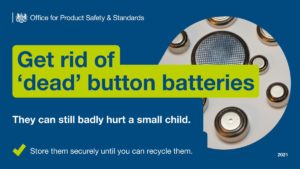battery safety
Safety campaign launched to highlight the dangers of button batteries
OPSS, working alongside RoSPA, the Chartered Trading Standards Institute, the Child Accident Prevention Trust, and the British and Irish Portable Battery Association, has produced a series of safety messages on how to keep children safe.
 Office for Product Safety and Standards (OPSS) has launched a Button Battery Safety Campaign, aimed at raising awareness of the potential hazards posed to children by button batteries, which are commonly use to power everyday items including car key fobs, remotes, and children’s toys
Office for Product Safety and Standards (OPSS) has launched a Button Battery Safety Campaign, aimed at raising awareness of the potential hazards posed to children by button batteries, which are commonly use to power everyday items including car key fobs, remotes, and children’s toys
If swallowed, these batteries could badly injure or kill a child. Button batteries react with saliva to create caustic soda, which is the chemical often used to unblock drains. If a child swallows a button battery and it gets stuck in their food pipe (oesophagus), it can burn a hole and cause internal bleeding, or even death. If a button battery gets into the stomach, it can also cause significant tissue damage.
Larger lithium ‘coin cell’ batteries (about the size of a five pence piece) are the most dangerous. Smaller batteries can be inserted into places such as ears and noses, causing serious injuries for children if undetected.
OPSS has relaves the following guidance:
Store spare batteries securely
Store spare button batteries securely and out of children’s reach. Be careful when opening multi-packs of button batteries to ensure they do not fall on the floor.
Know what products use button batteries
Ensure that you know what gadgets and toys use button batteries and check that the button battery compartment is secure. Put products with unsecured button batteries out of children’s reach. Under product safety regulations, button battery compartments in toys are required to be secured.
Educate older children about button batteries
Communicate with older children about the dangers of button batteries including why they should not play with them or give them to younger children.
Discard dead button batteries straightaway
Dead button batteries can still have enough power to badly hurt a small child. When you remove a button battery, store it securely, and recycle it properly and promptly.
Act promptly if you suspect a child has swallowed a button battery
If you think your child has swallowed a button battery, take them straight to the nearest A&E department or call 999 for an ambulance. Take the battery packaging, toy, or gadget if you can to help staff identify the battery. Symptoms may not be obvious. Your child might be coughing, gagging, or drooling, or pointing to their throat or tummy. Unclear or fluctuating symptoms mean it is important to be vigilant. Do not let your child eat or drink or make your child be sick.
Groups, businesses, and individuals are encouraged to support the button batteries safety messages by retweeting and posting them on social media, using the hashtag #buttonbatteries, or using the shared campaign materials.
The campaign materials can be downloaded here.
Safety campaign launched to highlight the dangers of button batteries
Dangers of button batteries highlighted in new safety campaign from OPSS and RoSPA.
Safety & Health Practitioner
SHP - Health and Safety News, Legislation, PPE, CPD and Resources Related Topics
In praise of older workers
Rebecca Hickman appointed as new RoSPA CEO
Lithium-ion battery fire risks – What you need to know (part two)

